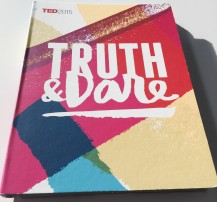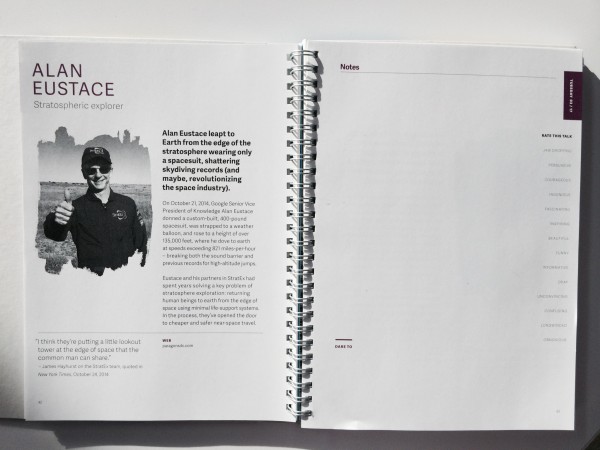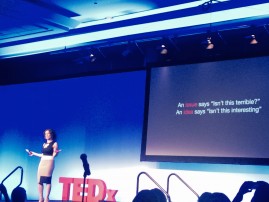There is no denying it: I am a TED fanatic. My enthusiasm for TED and TEDx talks propelled me to get involved in TEDxNashville. As a member of the TEDxNashville board, a consultant for the Speakers’ Committee, and the Chair of the Engagement Committee, I was gifted the opportunity to attend TEDActive in Vancouver and Whistler, Canada. I am here now, immersed in the world of TED, and happy to share some of my experiences with you.
My first two days at TEDActive have been transformative. Not only am I inspired and equipped to help elevate TEDxNashville to one of the most meaningful and positively influential TEDx events in the world, I also have fresh insights and a renewed appreciation for all public speakers and presentations.
For example, during my first day in Vancouver, I had the privilege of being one of the few people granted access to the artistically crafted, and wonderfully unique TED auditorium during speaker dry rehearsals. Many aspects of this experience blew my mind, especially watching TED curator Chris Anderson coach and challenge Alan Eustace on his TED talk just a few days before his scheduled talk.

As described in the guide distributed to TED2015 attendees, Alan Eustace leapt to Earth from the edge of the stratosphere wearing only a spacesuit, shattering skydiving records (and maybe, revolutionizing the space industry). As you can imagine, Mr. Eustace’s talk is brilliant and reveals a groundbreaking achievement, yet as a TED speaker, he was still required to participate in feedback sessions to refine his presentation.

Why am I telling you this? Because I want you to understand that even the brightest minds and most innovative thinkers in our world can still benefit from presentation training. That is why I am pleased to share with you some presentation tips that were presented by TED staff members during an exclusive workshop for TEDx leaders from around the world. For this post, I want to specifically focus on a few of the tips shared by Executive Producer of TED Media June Cohen during her presentation that answered the question, “What Makes a Great TED talk?”
At the heart of June Cohen’s message was the reminder that great TED talks are always intensely focused on a single idea. Elaborating on the critical importance of keeping one idea as the guiding light of a TED talk, June Cohen shared additional tips for speakers who strive to deliver a presentation in the wildly successful TED style.
1. Extract meaning from your stories.
You likely know the power of storytelling, especially for presentations and TED talks. However do you remember to extract meaning from your stories for your audience during your presentations? If not, start now. If you do not wrap your personal stories in a message or lesson that relates to your central idea, your story will be like a balloon, floating next to you on the stage as decoration, instead of acting as an arrow that shoots your message directly into the hearts and memories of audience members.
2. Don’t give a lecture.
Lectures typically present a series of facts, somewhat like a laundry list of information. TED talks, however, explore a single idea with unwavering focus. When you present a singular idea, and avoid tangents and loosely related facts and stats, you give your audience a clear takeaway from your presentation, making your message easier to recall and more likely to inspire action.
3. Don’t focus on an issue.

An issue says, “Isn’t this terrible?”
An idea says, “Isn’t this interesting?”
To ensure your talk or presentation is centered around an idea instead of an issue, frame your topic as a challenge, a proposal, or a solution. Don’t simply tell your audience about a problem, and then lead them to a conclusion that feels like a dead end. Talks that only present a problem typically do not motivate action, or inspire fresh perspectives to emerge. Audience members simply leave an issue-centric talk with the knowledge that the problem exists. That type of presentation is relatively pointless, and a waste of everyone’s time. Inspire action by focusing on an idea, instead of an issue.
4. Don’t be vague about your idea.
Clearly articulate your idea so the audience has no doubt about the meaning of your presentation. To demonstrate the importance of this advice, June Cohen shared one of her favorite talks, What if we lost the cheetah?, which she considered to be a “near miss” in the sense that the speaker, Laurie Marker, never clearly expressed her core idea.
Laurie Marker came close to stating her central idea, but coming close is not enough because it leaves the idea open to interpretation by the audience. By succinctly stating exactly what you want the audience to learn from your presentation, you eliminate confusion about the point of your presentation.
5. Start strong.
Earn the attention of your audience with the first few sentences of your presentation. TED talks, and many other presentations, eventually are shared with the world via an online platform such as TED.com or YouTube. When people view presentations online, they are tempted by many distractions such as email, social media, and chat messages from colleagues and friends. If you do not hook your viewers immediately, chances are you will lose your audience, and your message will impact a reduced number of people. Even if your presentation will never be shared online, do your audience a favor and be engaging from the beginning. If for no other reason, do this out of respect for the people in your audience.
Fighting with non-violence, a TED talk by Scilla Elworthy, was the example selected by June Cohen to demonstrate the power of starting with a strong hook.
Conclusion: To deliver presentations in the popular TED style, focus on one idea, and one idea only. You can support your idea with a foundation of related points, but all of your facts, stats, and stories need to clearly relate to your central idea to have the impact of a TED talk. Continue learning about the TED style by watching June Cohen share some of her other tips in the video below, filmed in 2010.
